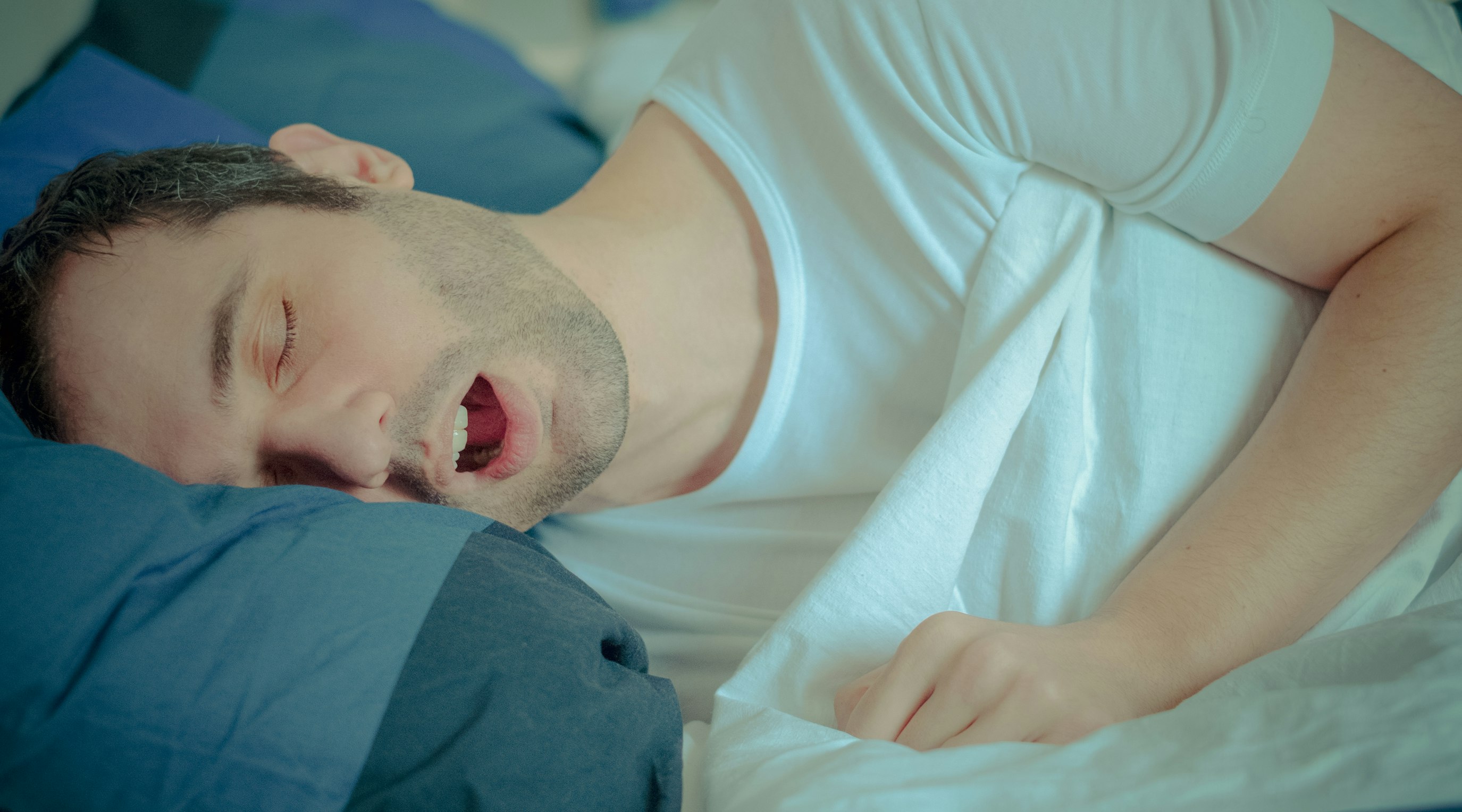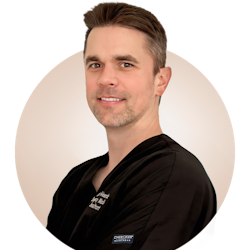How CBD may help people with sleep apnea
10 min read
Lucy MacKinnon
Exploring the potential of CBD for sleep apnoea relief
Sleep apnoea is a disorder that occurs during sleep when breathing involuntarily stops for short periods before restarting again. There are thought to be around one billion adults around the world who suffer from some form of sleep apnoea, although the condition can range from very mild to severe.
How CBD helps sleep is still being researched, but early evidence suggests it may be an effective treatment for sleep apnoea.
Although there are several treatments for sleep apnoea, in recent years, there has been an increasing amount of research into the potential benefits of medical cannabis, in particular CBD. Some studies have shown that certain properties of CBD may enhance sleep stability and reduce the symptoms related to sleep apnoea.
Contents
The challenges of sleep apnoea and how cannabis might help
There are three main types of sleep apnoea:
- Obstructive sleep apnoea (OSA) – where airflow into the lungs is blocked through the unintended relaxation of the throat muscles. This is, by far, the most common form of sleep apnoea.
- Central sleep apnoea (CSA) – occurs when the brain stops sending the correct signals to the groups of muscles that control breathing.
- Treatment-emergent central sleep apnoea – this is diagnosed when a patient is treated for OSA that then converts to CSA during treatment
All three types of sleep apnoea are chronic conditions that can have severe long-term health consequences if not addressed and treated correctly. These include a higher risk of developing type 2 diabetes, high blood pressure, heart disturbances, and liver problems.
Short-term health concerns can include excessive tiredness, difficulty concentrating, irritability, and even falling asleep in situations where this should not be happening (at work, or worse, while driving). Although sleep apnoea sufferers are technically asleep when apnoea occurs, it can interrupt the brain’s sleep patterns and lead them to feel tired even after a “full night’s sleep”.
The major symptoms of sleep apnoea
- Interrupted breathing
- Gasping, snorting or choking
- Frequent waking during the night
- Prolonged snoring
- Waking up with an extremely dry mouth
- Morning headaches
Lifestyle changes to help control the severity of your sleep apnoea
- Losing weight
- Regular exercise
- Drinking alcohol moderately or not at all
- Smoking cessation
- Use of nasal decongestant
- Not sleeping on your back
- Avoiding sedative medications
Physical interventions that may help sleep apnoea
- Positive airway pressure (PAP) devices: fitting a device to ensure all airways are kept open to prevent breathing interruptions. Continuous positive airway pressure (CPAP) machines are considered the gold standard of sleep apnoea treatment.
- Oral Appliances (mouthpieces): oral devices designed to keep the airways open, usually by bringing the lower jaw forward. Mouthpieces are typically only offered after a patient has found that they cannot sleep well when using one of the PAP machine treatments.
- Surgery: Surgery is only considered when all other treatments have been explored, and most often involves the removal of small amounts of tissue from the back of the mouth or top of the throat.
So, does CBD work for sleep apnoea?
What studies say about CBD for sleep disorders and apnoea
The administration of CBD to treat sleep apnoea is still in its early stages from a scientific point of view. Unfortunately, there seem to be no research papers we can pull data from at this point in time that specifically look at the relationship between CBD and sleep apnoea. But, there has been a considerable amount of general research into CBD for sleep disorders, as well as potentially reducing the anxiety that sleep apnoea patients may feel regarding sleep or lack thereof.
The CBD sleep study “Cannabidiol in Anxiety and Sleep: A Large Case Series” found that 79.2% of participants reported anxiety relief, and 66.7% reported improved sleep scores. It concluded that
“CBD may have a calming effect on the central nervous system and may be a potential treatment option for anxiety and sleep disorders”.
Encouraging data indeed.
When looking at medical cannabis sleep studies with a broader view, it is clear that the cannabis may hold at least some potential to reduce the heavy burden that sleep apnoea places on sufferers.
One study into dronabinol, a synthetic version of THC, has shown particular benefits for helping with sleep apnoea. The study, while focusing on animal subjects, found that dronabinol had the ability to reduce the “apnoea index” by 42% and 58% in non-rapid eye movement (NREM) and REM sleep, respectively.
Another study, again looking at the effectiveness of dronabinol but this time in human subjects, found that while there was no significant difference recorded in oxygenation, daytime sleepiness was greatly reduced with higher doses of the synthetic cannabinoid.
It should also be noted that at this stage only a handful of studies have been conducted and, to date, the overall results have failed to support the routine clinical use of CBD therapies for sleep apnoea. But it’s also worth pointing out that the clinical trial method always errs on the side of caution, and further research is currently being carried out.
In a report titled “Cannabinoid therapies in the management of Sleep Disorders: A systematic review of preclinical and clinical studies” published in the National Library of Medicine, it was stated that:
"Promising preliminary evidence provides the rationale for future randomised controlled trials of cannabinoid therapies in individuals with sleep apnoea, insomnia, post-traumatic stress disorder-related nightmares, restless legs' syndrome, rapid eye movement sleep behaviour disorder, and narcolepsy."
In addition, a 2002 study also revealed
“Potent suppression of sleep-related apnoea by both exogenous and endogenous cannabinoids. These findings are of relevance to the pathogenesis and pharmacological treatment of sleep-related breathing disorders”.
CBD is an exogenous cannabinoid, with endogenous cannabinoids being produced by the human body.
How to administer CBD for sleep apnoea
With all that laid out, can CBD help sleep apnoea?
At this point, there is not enough scientific research available to make any definitive claims regarding the efficacy of CBD in potentially helping people with sleep apnoea specifically. It may help reduce the anxiety that is sometimes brought on by the condition, and may also help with overall restfulness.
The CBD dosage for sleep apnoea is an area of research that we hope to have more data on in the future. But, as of now, there is no standardised recommended dosage for this specific condition.
CBD products for managing sleep apnoea
Although the jury is still out on whether CBD can help manage sleep apnoea, thanks to sweeping changes made in the past decade or so, not only here in the UK but in many countries, regarding the legality of medicinal cannabis, the range of CBD products available to patients is growing.
In addition, the regulatory oversight and production standards that come with medical CBD are much more stringent than those placed on over-the-counter options. CBD oil for sleep apnoea is what most clinicians would recommend, but there are other options available.
CBD oil can be taken sublingually, which is when it is placed under the tongue for 30 to 60 seconds before being swallowed. This method allows the CBD to enter the bloodstream directly, bypassing the digestive system and offering a rapid onset of potential therapeutic effects.
Other options include capsules, edibles, and topicals.
And then we have prescribable medical cannabis options. When conventional treatment options come up short, medical cannabis treatment for sleep disorders is a legal option for UK patients to consider
Navigating the potential side effects of CBD treatment for sleep apnoea
Although the risks and side effects associated with the medical administration of CBD are generally minimal, it is still important to be well-informed before beginning any form of CBD therapy for sleep apnoea.
The list of potential side effects of CBD includes:
- Drowsiness
- Dry mouth
- Low blood pressure
- Light-headedness
- Nausea or GI discomfort
- Diarrhoea
CBD can also cause some negative interactions with certain pharmaceutical medications, mostly blood thinners, sedatives, and some painkillers.
It’s always recommended that you consult a doctor before taking any treatment for sleep apnoea and closely monitor the progress of any new treatment.
CBD for sleep apnoea FAQs
Is CBD an effective treatment for sleep apnoea?
While there have been some promising studies on the potential benefits of CBD in managing sleep apnoea, more research is needed before any definitive claims can be made. With that said, CBD may help reduce anxiety related to the condition and improve overall restfulness.
What dosage of CBD should I take for sleep apnoea?
As of now, there is no standardised recommended dosage for CBD in treating sleep apnoea. It's best to consult a doctor and closely monitor the progress of any new treatment.
What are the potential side effects of CBD treatment for sleep apnoea?
Some potential side effects include drowsiness, dry mouth, low blood pressure, light-headedness, nausea or GI discomfort, and diarrhoea. CBD can also cause negative interactions with certain medications. It's important to consult a doctor before starting any new treatment.
Are there different types of CBD products available for sleep apnoea?
There is no one specific type of CBD product that is recommended for sleep apnoea. Some common options include oil, capsules, edibles, and topicals. Each may offer different onset times and methods of consumption.
How can I make sure I am taking high-quality CBD for sleep apnoea?
It's essential to do thorough research on the brand and their production standards before purchasing any CBD products. Medical-grade CBD is typically regulated and held to higher standards than over-the-counter options. Consulting a specialist doctor can also help you select a reputable brand.
Final Thoughts
Although the research is still inconclusive from a clinical point of view, early studies seem to indicate that there is potential for CBD to alleviate the suffering of some of the one billion sleep apnoea sufferers around the world.
With CBD showing promise in encouraging respiratory stability during the night, it may be possible to improve the worst symptoms of apnoea, which could have long-term benefits for chronic sufferers. CBD effects may also be able to improve overall sleep quality and help to reduce some of the waking-hour symptoms of apnoea.
CBD will not cure sleep apnoea, but if you would like to learn more about the power that medicinal cannabis may hold for your set of circumstances, we are here to help.
Releaf understands the importance of medical cannabis in treating various medical conditions. With our tailored monthly packages, specialist consultations for medical cannabis, and a unique medical cannabis card for protection, you can access the treatment you need without worrying about the stigma.
Share article
Did you like this article?
It is important to seek medical advice before starting any new treatments. The patient advisors at Releaf are available to provide expert advice and support. Alternatively, click here to book a consultation with one of our specialist doctors.
Elevate your wellness with medical cannabis
Get comprehensive care, convenience, and confidence with an all-in-one treatment plan.
Am I eligible?Authors
With five years of journalism and healthcare content creation under her belt, Lucy strives to improve medical cannabis awareness and access in the UK by producing high quality, credible content.
meet our specialist
Editorial Policy
All of our articles are written by medical cannabis experts, guided by strict sourcing guidelines, and reference peer-reviewed studies and credible academic research. Our expert clinical team and compliance specialists provide valuable insights to ensure accuracy when required. Learn more in our editorial policy.
Need more help?











